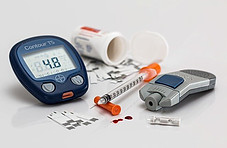 Ever wonder about Intermittent fasting and diabetes?
Ever wonder about Intermittent fasting and diabetes?
I certainly have.
I mean I have heard so much lately about the benefits of intermittent fasting for weight loss that I got curious.
While I don’t have type 1 myself, my young grandson does.
Dieting for weight loss is certainly not something any of us would encourage at his young age of 5 years but I was thinking about when he is older.
My daughter has been concerned that he may gain weight from his insulin since weight gain is a well-known side effect of taking insulin.
Kind of a double-edged sword there, the very same life-saving medication required can cause weight gain, yet controlling weight is an important part of diabetes management.
Before we can decide whether intermittent fasting is something we wish to try we must first understand what is is.
Table of Contents
What is Intermittent Fasting(IF)
Fasting has been around for centuries for religious, philosophical, or personal reasons. Many believe there are several benefits like resting the digestive system, eliminating toxins, or purifying the body. However, fasting and the associated lack of food and nutrients can severely challenge the body especially for those with diabetes.
However, researchers have stated, “because animals, including humans, evolved in environments where food was relatively scarce, they developed numerous adaptions that enabled them to function at a high level, both physically and cognitively, when in a food-deprived state.”
There are different types of fasting such as:
- intermittent fasting (abstaining from food for a limited time)
- periodic fasting (going without food for several days)
In this article, I will be focusing on Intermittent fasting and try to determine whether or not it is a safe option for type 1 diabetics.
I was completely unaware that intermittent fasting has different methods to choose from as well so we will explore some of those options.
Alternate Day Fasting
With alternate day fasting you would eat your regular meals one day then restrict your calories to 600 or less the next day and repeat this process throughout the week.
There is also a popular 5:2 plan. In this plan you eat your normal healthy diet for 5 days then for the remaining two days, you would cut down to 500 – 600 calories.
That sounds pretty tough to me, I don’t think I could maintain that plan.
Time-Restricted Eating
In this method, you would get all your daily calories within a specified time period each day.
For example, on an 8-hour plan, you may choose to eat all your food between 10 am and 6 pm and only drink 0-calorie drinks to hydrate between.
I actually do this on a regular basis without even trying. I usually don’t eat breakfast. I eat a healthy lunch between noon and 1 pm and then a healthy supper around 5 or 6 pm.
That’s it, I don’t snack except on weekends, usually popcorn in the evening while watching a movie or youtube videos.
I don’t find it difficult, in fact, I am not usually hungry in the mornings but I usually have a pretty good appetite come lunchtime.
Surprisingly, my natural habits were actually a form of intermittent fasting.
Benefits
Most of the laboratory research around intermittent fasting (IF) has been done with animals.
Scientists are now studying the effects on people, while these studies are promising, more research is needed.
There may be some general health benefits to fasting such as:
- may reduce inflammation
- may aid in weight loss
- may lower cholesterol
- may improve how the body manages glucose(blood sugar)
- may reduce insulin resistance
In one small study, 10 obese men with type 2 diabetes followed a time-restricted eating plan. They improved their fasting glucose and lost weight over a 6 week period.
Another very small study included 3 men who had had type 2 diabetes for 10-25 years. Under medical supervision, these men fasted every other day or 3 days a week. Within a month, all of the men were able to stop taking insulin and in less than a year they were able to stop taking other diabetes medications.
While larger studies are required these results are promising. I have not found laboratory studies on type 1 diabetes as yet.
If you are overweight, losing weight may be beneficial since Diabetes Canada states that maintaining a healthy weight can:
- help you prevent or manage diabetes
- improve blood sugar, blood pressure and blood lipids (fats)
- reduce the risk of complications such as heart disease and stroke
- improve general well-being and energy levels
Keep in mind any form of fasting is not required for weight loss.
Risks
Naturally, there are certain risks associated with fasting.
- initially, you may feel hungry
- may feel drowsy and/or irritable
- you may geta headache
- fasting for longer than a day or so you may experience malnutrition
- Diabetics may experience hypoglycemia
- if also exercising may experience hyperglycemia
Prior to Intermittent Fasting(IF)
Now that we have discussed both the advantages and potential risks let’s learn how a diabetic can use IF safely
Talk to your doctor
Because everything you do will affect your blood glucose and therefore your treatment plan it is imperative to discuss your plans of IF with your doctor or diabetes care team.
If your doctor gives you the OK, be sure to ask whether you should check your blood sugar more frequently or adjust your medications during and after fasting.
Watch for sign of hypoglycemia
When fasting there is always the risk of hypoglycemia (low blood sugar).
Keep an eye out for the symptoms and be sure to eat something if you experience:
- feeling shaky
- sweating
- confusion
If you do experience these symptoms eat a glucose gel or have a sugary drink. Once your blood glucose level is more normal eat a balanced meal and try fasting another day.
Use Caution when you resume eating
Sometimes after fasting we are too hungry and can make unhealthy choices. Be careful you don’t overload on carbohydrates.
Choose healthy balanced meals and snacks.
Eating too many carbohydrates after fasting can cause your blood sugar levels to become too high.
Be careful with exercise
Different types of exercise affect the body differently.
For example, if you are going to be doing a cardio workout (exercise that really increases the heart rate) such as running or cycling you may experience low blood sugars. Be prepared by having fast-acting sugar snacks with you.
If you choose anaerobic exercise such as weight lifting it may cause your blood sugars to rise causing hyperglycemia and a half dose of insulin may be required.
As a diabetic, you must always be prepared to treat the highs and lows as they occur. Check out ==>Huge Savings on Diabetic Supplies!
Stay hydrated
Diabetes increases the risk of dehydration which can make managing blood glucose levels more difficult.
Drink plenty of water and calorie-free beverages especially when fasting.
Calorie-free beverages include water, unsweetened tea, or unsweetened coffee.
It’s a Balancing Act
You know your body’s usual patterns when it comes to your blood sugars. Do you typically wake up high? Low? Or in range?
In range would certainly be helpful especially if you intend to fast but not everyone wakes up in the target.
So let’s look at a few options.
If you Wake a little high
You could take a reduced correction dose and carry on with the fast. Taking that bolus could set you up for a low later on so be prepared to treat a low.
Should you choose not to take that insulin dose, you will be running high which risks DKA and other complications. Your first priority is healthy blood sugar levels so it might be best to take that bolus and make it part of your fast.
If you wake low
you obviously have to eat and fasting is not going to work out for you today.
Eat a healthy breakfast and get those blood sugars back on track. You can always try again tomorrow.
Routinely wake up too high or too low
it may be time to revisit that long-lasting insulin.
Consistently waking high could mean you are taking too much long-lasting.
Likewise consistently waking too low means you could be taking too much.
Work with your doctor to determine the best dose for you.
Sneaking late-night food
If you are up late and binge-eating carbohydrates you need to deal with that problem rather than think about fasting.
Eliminating those midnight snacks will go a long way towards losing the weight you wanted to lose.
Final Thoughts
Intermittent Fasting and Diabetes is a controversial topic.
There are those who with medical supervision have had success using intermittent fasting as a weight-loss strategy.
However, the risks to diabetics can be substantial.
If you are considering IF as a weight loss/weight management tool I recommend talking with your doctor or diabetes care team.
You may need to make adjustments to your medication dosages or timings but don’t do this on your own, always seek medical advice when considering lifestyle changes.
Yes, there are ways to make IF work well for a diabetic, and research is promising that it can be beneficial but much more research is required for a solid answer to be reached.
“I am not in any way a medical practitioner, please do not rely on the information on our website as an alternative to medical advice from your doctor or another healthcare provider. We only share our experiences.”
Have you tried IF while managing your diabetes?
How did it work for you?
I welcome all suggestions and advice in the comment section below. Stay safe.

Hi Deborah, I am not diabetic, so I can’t share my experiences in that area. I practice intermittent fasting, so I can say something about that.
A couple of years ago I had to lose a lot of weight due to too high cholesterol levels. I didn’t know about IF back then, so I lost weight by just eating less and exercising. When I did hear about IF I wanted to try that myself (as I often try new things out of interest).
I had the 5-2 days plan for a while, but I didn’t like that either.
Accidently we skipped dinner after lunching out a couple of times, and that pleased me more. So nowadays I have breakfast and lunch and some nuts at 5 pm. Making the schedule 8-16 hours or 9-15 hours. I love it. I reached my desired weight 2 years ago and am staying that weight ever since.
Like you, I would be hesitant to let a child follow that regime. Children have to grow and need energy for that. But I too hear positive stories about adult diabetics, so it’s worth a try. Especially with the precautions you describe. 🙂
Hannie, thanks for sharing your experience with IF. I find it so much easier to eat only a light lunch and supper. My husband is on his own for breakfast which suits him fine. He has breakfast while I hit the treadmill. For me eating three meals a day is just too much food and makes me feel tired and sluggish. By following IF I have way more energy and clarity throughout the day. I am hoping to reach my desired weight within the year, I am certainly on track to do so. Take care my friend.
This is a fascinating topic, I am not diabetic myself but grew up with my grandad who was type 1 diabetic so am quite familiar with the condition. I myself have also a natural IF diet just like yourself and I must admit when I eat out of my usual habits and eat breakfast and later at night I do tend to gain weight and have less energy.
The research is looking promising for diabetics though! Fingers crossed.
Hi Amy, I have discovered that many people naturally follow an IF diet. I agree that I do feel heavy, sluggish, and tired when I eat breakfast or later in the evening. For me it just isn’t worth it. Yes, the research for diabetics is promising and it is important for any diabetic who wants to try IF to work with a doctor who is knowledgeable about intermittent fasting. Thanks for your comment, I wish you good health.